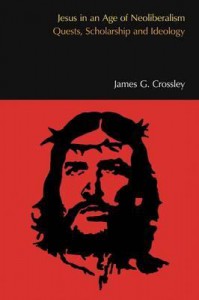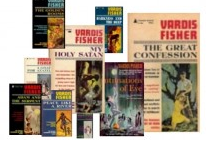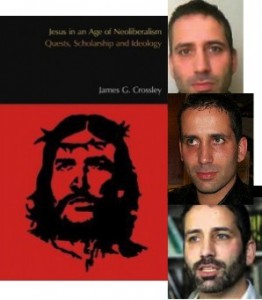
This is part 3 of my review of Jesus in an Age of Neoliberalism: Quests, Scholarship and Ideology by James G. Crossley. (Once again I invite Professor Crossley to alert me to anything he sees in these posts that he believes is a misrepresentation of his views.)
In the previous post we saw how James Crossley uses chapter 2 to convey a general idea of the concepts scholars of “postmodernism” associate with postmodernity, postmodernism and related political and economic developments. This is essentially to set the “broad contextual basis”, Crossley explains, “for analysing some of the ways in which Jesus has been constructed in scholarship and beyond in recent decades.”
Crossley’s own political polemic dominates his discussion. His concluding paragraph begins:
Many people now look back in disbelief over the past decade, and the roles of Bush and Blair in particular. But now we have Obama, the great liberal figure of our time. . . .
And continues . . .
Yet, beneath the high rhetoric, Obama rarely deviated from standard American positions on the Middle East in recent years and provided minimum detail. And, in the heart of an anti-democratic police state with an unfortunate human rights record . . .
And concludes . . .
as he stood shoulder to shoulder with Mubarak, an issue which is apparently best forgotten now that the Western media could no longer avoid showing Mubarak for what he is.
No reference to biblical scholarship. As I pointed out previously, in major respects I sympathize with Crossley’s political views but I was led to read a book expecting an explanation of how political and related trends influenced Jesus scholarship; rather, one senses that Crossley is hoping to politically (re)educate his scholarly peers.
The Wrong, the Defeated and the Exception
So we come to chapter 3 which is about Biblioblogging.
By the time I had read this chapter I was still none the wiser about the impact of politics or neoliberalism on historical Jesus scholarship. More background, perhaps. Fair enough. I’ll have to be patient. Crossley does spotlight the generally conservative political views of biblical scholars and discusses an exception or two, but the reader is left without any focus on how these political viewpoints have shaped the actual scholarship on Jesus. Crossley even seems to confuse the word “scholarship” with “scholars”. His concluding remarks begin:
These two test cases provide us with instances of how scholarship (sic) can explicitly react with key issues associated with neoliberalism and postmodernity, and contribute in its own small way to the sometimes silent perpetuation of neoliberal ideology. (p. 61)
The two test cases are (1) the views related to the Haiti earthquake that scholars expressed on their blogs and (2) the political controversies raised among biblical scholars by a blogger going under the name of N.T. Wrong. Nowhere in the chapter does Crossley explain how any of these political views impact on Jesus “scholarship” itself. If the point is to demonstrate how politically conservative biblical scholars are on the whole and how they fit the cultural and systemic paradigms that support the institutions and ideologies of neoliberalism then the point is certainly made clear enough.
Again, what comes through loud and clear is that Crossley is embarrassed by the politics of his peers and he wants them to rethink and change their political views.
Maybe the fault is mine; maybe I’m too familiar with the political and ideological concepts and have long taken for granted the place of biblical scholars within “the system”. I’m surely not Crossley’s intended audience.
But there are two incidents that Crossley does refer to that I felt deserved far more elaboration and analysis than he gave them. And again, they are incidents that touch upon the ideological function of historical Jesus studies at a deeper level that seems to escape Crossley’s notice.
Missing the Real Wrong

The first was this:
Of Hector Avalos, author of the controversial and provocative book, The End of Biblical Studies, Wrong claimed, ‘Once a fundie always a fundie. He’s just batting for the other side, now. . . Avalos is a fundie in manner and to a lesser extent in context. In manner, he is doctrinaire about his own beliefs, with a tendency to generalize about the opposition.‘ (p. 49)
This screams for Crossley’s analysis and commentary but Crossley only brought up these words of N.T. Wrong to demonstrate that Wrong was not an “atheist apologist”.
What we see here is N.T. Wrong manipulating significant symbols (recall the propaganda models that Crossley bypasses as I mentioned in the previous post) to exclude Hector Avalos from “polite scholarly society”. Wrong’s own generalized and doctrinaire dismissal of Avalos’s critique of contemporary biblical studies with that manichaean symbol “fundie” speaks volumes about biblical scholarship’s ideological defensiveness.
Much later in the book Crossley does give attention to Avalos’s criticisms of scholar’s failing to to meaningfully engage with issues of class and poverty. Interestingly, Crossley introduces his name apologetically:
if there is one non-religious figure presently constructed as an extremist it is Hector Avalos. Whatever we may think of his arguments ‘on the end of biblical studies’ . . . . . (p. 214)
Surely a discipline that has at least a questionable scholarly relevance in a modern university is going to play the defensive and conservative game as a matter of self-preservation. (Is not this itself a question worthy of serious research?) Acting and speaking as a support or on behalf of neoliberalism’s (neo-)conservative or big-L “Liberal” values and playing to the constituencies that feed them is going to come as naturally as night follows day. Crossley misses all this. Would the alternative be to risk being accused of siding with someone cheaply and falsely cast out as a “fundie”?
N.T. Wrong did express his/her own controversial political views but at the end of the day these were ignored or had no impact on the political outlooks of other bibliobloggers. This tendency for anything that might present a serious challenge to establishment thinking is deflected from causing any ‘harm’ by simply being ignored or sidelined — and that is illustrative of the way the Herman-Chomsky propaganda model works, as Crossley explains. No doubt Hector Avalos is well aware of that, too.
Buckling Under Pressure
 The other case has to do with Chris Tilling’s blog series on Christian Zionism.
The other case has to do with Chris Tilling’s blog series on Christian Zionism.
Tilling has been critical of Christian Zionism and was initially keen to show that it was not merely a theological curiosity because it ‘impacts world politics.’ He wrote explicitly of political issues surrounding the British Mandate, the founding of the State of Israel, Christian Zionist involvement in Israeli politics and so on. Tilling received plenty of emails and comments and it became clear that there was increasing pressure from Christian Zionists and others for him not to be critical (even before Tilling had made any judgment in some cases!), and so Tilling had to emphasize that he was more interested in theology and hermeneutics rather than politics. Eventually the political issues were abandoned by Tilling and it seems to be that this was due to the pressure placed on him. (p. 54)
James Crossley includes blogs by amateurs in his discussion of biblioblogs so I believe Vridar qualifies for his purview. Crossley’s point about the world of biblioblogging being subject to certain political ideological pressures would have been a touch stronger if he could have shown that a blog that clearly does stand apart from the scholarly establishment, yet whose content is reputed often to be the equal to the scholarly standards of several of the biblical scholar’s blogs, likewise posts controversial articles that directly challenge the neoliberal political ideologies and propaganda of the day without buckling under the pressure that is said to have caused Tilling to cave in.
The Overlooked Exception
 This blog, too, received very strong reprimands from some hitherto very good friends and supporters for its owner’s views on Islamophobia, the reasons for terrorism according to academic research and the Israel-Palestine question. Several long time readers were deeply offended and stopped reading altogether. On other grounds reputable mainstream scholars have branded Tim and I as “fundies”. Lies are enough to substitute as evidence to justify the claim. (Crossley certainly knew of this blog when he wrote his book; he was deeply offended by this blog’s radical crtique of core assumptions he shares with his peers on historical Jesus studies.)
This blog, too, received very strong reprimands from some hitherto very good friends and supporters for its owner’s views on Islamophobia, the reasons for terrorism according to academic research and the Israel-Palestine question. Several long time readers were deeply offended and stopped reading altogether. On other grounds reputable mainstream scholars have branded Tim and I as “fundies”. Lies are enough to substitute as evidence to justify the claim. (Crossley certainly knew of this blog when he wrote his book; he was deeply offended by this blog’s radical crtique of core assumptions he shares with his peers on historical Jesus studies.)
Crossley apparently fails to see his own place in the system he is perpetuating. His own voice stands to be ignored ultimately and as surely as “N.T. Wrong’s” on political questions. He himself is one of the bulwarks of an institution that serves little point other than to massage some of the major cultural symbols of the West and enable them to serve (presumably “politically correct”) causes. Any historical inquiry into origins of the systems or religions that has brought us those symbols must by definition conform to the models that sustain those symbols. This is the field of biblical studies and understanding its social functions enables us to understand why we find at its foundations so many unsubstantiated assumptions, circular arguments and lapses of logic. I don’t know of any other blog that so consistently attempts to bring these flawed foundations to wider notice and discussion.
An increasing number of scholars in Old Testament studies haves, to their credit, been prising themselves away from these ideological functions that essentially serve a religion whose faith itself confuses earthly history with heavenly puppeteers. It is in the area of historical Jesus and Christian origins studies that the same radical change is yet to occur.

If you enjoyed this post, please consider donating to Vridar. Thanks!
